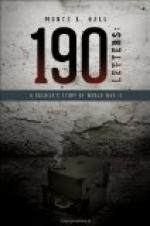Whole trains of cattle-trucks, which can hardly be said to have changed their use! Trains in which is heaped up the desolation of these people torn from their homes, and how quickly become as beasts! Misery has stripped them of all their human attributes. We take them food and drink, and that is how they become exposed: the man drinks without remembering his wife and children. The woman thinks of her child. But other women take their time, unable to share in the general haste. Among these waifs there is one who assails my heart,—a grandmother of eighty-seven, shaken, tossed about by all these blows, being by turns hoisted into and let down from the rolling cages. So trembling and disabled, so lost. . . .
September 10 (from a note-book).
We arrive in a new part of the country on the track of good news: the strong impression is that France’s future is henceforth assured. Everything corroborates this feeling, from the official report which formally announces a complete success down to the most fantastic rumours.
September 13 (from a note-book).
This is war; here are we approaching the place of horror. We have left behind the French villages where peace was still sleeping. Now there is nothing but tumult. And here are direct victims of the war.
The soldiers: blood, mud and dirt. The wounded. Those whom we pass at first are the least suffering—wounds in arms, in hands. In most of them can clearly be seen, in the midst of their fatigue and distress, great relief at having been let off comparatively easily.
Farther on, towards the ambulances, the burying of the dead: there are six, stretched on two waggons. Smoothed out, and covered with rags, they are taken to an open pit at the foot of a Calvary. Some priests conduct, rather than celebrate, the service, military as they have become. A little straw and some holy water over all, and so we pass on. After all, these dead are happy: they are cared-for dead. What can be said of those who lie farther on and who have passed away after nights of the throes of death and abandonment.
. . . From this agony there will remain to us an immense yearning for pity and brotherhood and goodness.
Wednesday, September 16, 1914.
In the horror-zone.
The rainy twilight shadows the road, and suddenly, in a ditch—the dead! They have dragged themselves here from the battlefield—they are all corrupt now. The coming of darkness makes it difficult to distinguish their nationality, but the same great pity envelops them all. Only one word for them: poor boy! The night for these ignominies—and then again the morning. The day rises upon the swollen bodies of dead horses. In the corner of a wood, carnage, long cold.
One sees only open sacks, ripped nose-bags. Nothing that looks like life remains.
Among them some civilians, whose presence is due to the German proceeding of making French hostages march under our fire.




